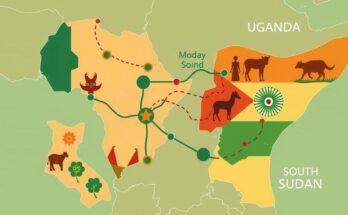The UN Security Council held an emergency meeting to discuss the escalating crisis in Goma, DRC, where conflict between M23 rebels and Congolese forces has displaced over 178,000 individuals. The humanitarian situation is dire, with MONUSCO’s resources strained and civilian safety at great risk. Immediate international action is urged to ensure the protection of civilians and establish a political solution to the ongoing conflict.
The United Nations Security Council convened an emergency meeting to discuss the worsening situation in Goma, Democratic Republic of the Congo (DRC), underscoring the urgent need for international intervention. Vivian van de Perre, Deputy Head of the UN Stabilization Mission in the DRC (MONUSCO), reported on the severe humanitarian crisis caused by the conflict between M23 rebels and Congolese forces. The recent clashes have displaced over 178,000 individuals with many seeking refuge in overcrowded sites.
Amid the escalating violence, Ms. van de Perre noted that attacks by the M23 and Rwandan Defence Forces (RDF) have resulted in civilian casualties and further displacement. MONUSCO’s capacity to provide refuge is being severely tested, as it struggles to accommodate the influx of civilians and surrendering combatants. Resources are stretched thin, and many individuals are unable to find safety within UN facilities.
The security of MONUSCO bases has also been compromised due to direct attacks. Reports indicate that mortars have struck UN compounds, causing significant operational challenges and endangering personnel. Despite the complications, MONUSCO is working alongside regional partners to facilitate medical evacuations for injured peacekeepers and civilians, even in the face of closed access routes.
Ms. van de Perre emphasized the vulnerability of displaced populations, particularly women and children, who face heightened risks of sexual violence. She called upon all involved parties to ensure the protection of civilians and access to essential services. Immediate action is necessary to address the suffering and reestablish basic humanitarian corridors within the region.
A political solution is deemed critical, as military means alone cannot resolve the conflict. Ms. van de Perre advocated for the resumption of the Luanda Process to help de-escalate tensions and prevent a potential escalation into a third Congo war. Urgent and coordinated international action remains essential to alleviate the ongoing crisis and support vulnerable populations in Goma and surrounding areas.
The Democratic Republic of Congo (DRC) has been experiencing enduring instability due to conflict involving various armed groups, most notably the M23 rebels who have received support from neighboring Rwanda. Goma, located in eastern DRC, has been at the epicenter of the humanitarian crisis, with hundreds of thousands displaced due to violence. The United Nations Stabilization Mission in the DRC (MONUSCO) plays a crucial role in providing protection and aid, but current circumstances reveal significant strains on its operations amid escalating violence and the influx of internally displaced persons (IDPs).
The situation in Goma represents a profound humanitarian crisis that necessitates immediate international intervention. The ongoing violence and instability threaten both civilians and humanitarian operations, intensifying the need for safety and humanitarian access. The emphasis on political resolution and the protection of vulnerable populations underscores the urgency of addressing the issues at hand to avoid further deterioration of the situation.
Original Source: news.un.org




